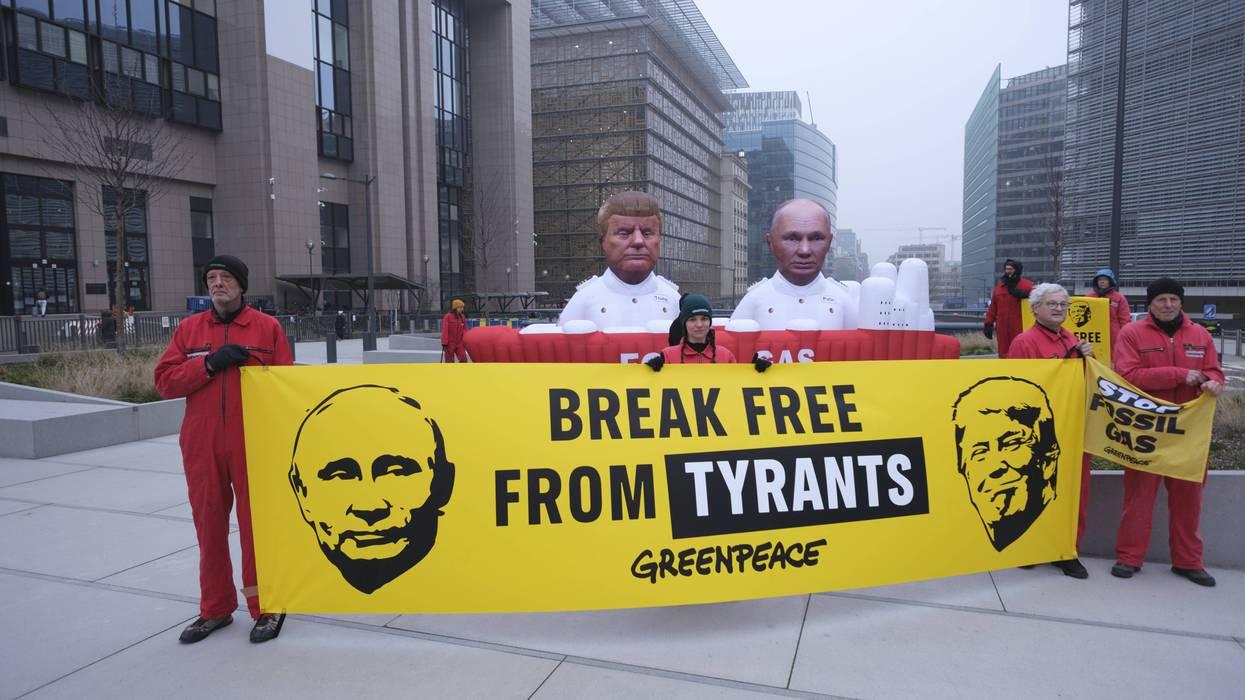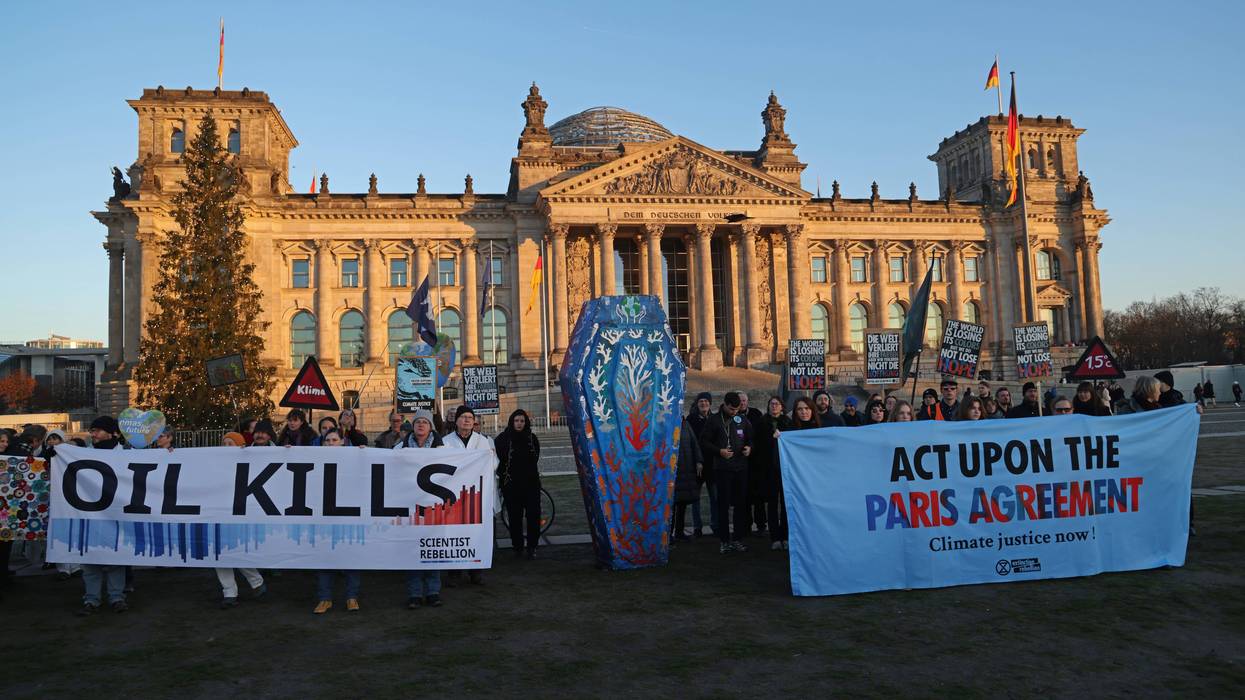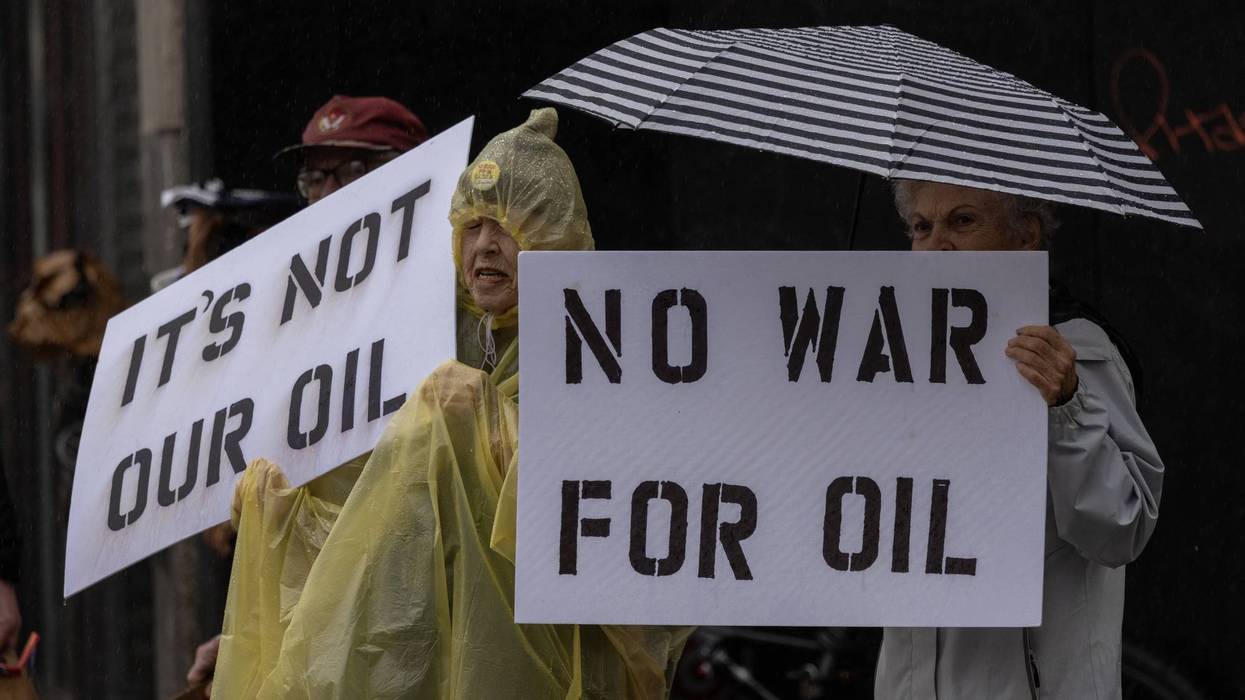120+ Groups Call on EU to Resist Trump's 'Fossil-Fueled Imperialism' and Cancel US Trade Deal
"The EU is at a fork in the road: It can follow the US down a volatile, destructive path or it can forge its own course toward stability."
As the European Parliament debates the trade agreement reached last year by President Donald Trump and European Commission President Ursula von der Leyen, more than 120 civil society groups from across Europe and the globe on Thursday warned that the demands Trump has made on the bloc and his "contempt for international law" have made clear that the US is currently "no longer a good-faith partner."
In solidarity with countries that have been directly threatened with Trump's "fossil-fueled imperialism"—Venezuela and Greenland—the EU must reduce its reliance on US fossil fuels and cancel the negotiation and implementation of the trade deal, said Oil Change International, one of the signatories of the open letter that was sent to von der Leyen and other top EU officials.
The letter notes that Trump has already shown that in a deal with the US, the EU will be pressured to "dilute its own climate commitments" and "enrich US fossil fuel companies" at the bloc's expense.
"His administration has attacked the EU's methane regulation and its Corporate Sustainability Due Diligence Directive, seeking to weaken Europe's ability to hold corporations accountable for climate and human rights harms," reads the letter, which was also signed by Coal Action Network in the UK, Urgewald in Germany, and a number of US-based groups including Public Citizen.
Von der Leyen agreed to the deal last July after Trump threatened the bloc with "economically devastating tariffs," the groups wrote, ensuring the EU would import $750 billion in US energy products including liquefied natural gas (LNG).
Those imports will "contaminate the air and water of nearby communities, increasing their risk of cancers, asthma, and other serious health harms," warns the letter, while also being projected to raise energy costs for households across Europe.
Up to 1 in 4 homes in the EU already struggle to adequately heat, cool, or light their homes, wrote the groups.
James Hiatt, executive director of the US group For a Better Bayou, called on EU leaders to "side with communities like mine, not the fossil fuel executives bankrolling Trump, by ending its reliance on US gas.”
“There’s nothing clean about US LNG," said Hiatt. "This industry has destroyed wetlands, damaged fishermen’s livelihoods, and condemned Gulf South communities like mine to higher rates of heart conditions, asthma, and cancer. We’re also on the frontlines of hurricanes and flooding made worse by continued fossil-fuel dependency Europe keeps importing."
The groups wrote that "every euro spent on US non-renewable energy, and every fossil fuel investment made by European companies and banks in the United States, fuels Trump's authoritarian agenda at home and his imperial ambitions abroad."
"The only way Europe can reach energy independence and free itself from outside pressures is by implementing a just transition away from fossil fuels and relying on energy sufficiency/efficiency and homegrown renewable energy," reads the letter. "Done well, this can support decent jobs and sound local economies."
By ratifying the deal with the US, the groups added, the EU will only be "switching one dangerous dependency for another," following its phase-out of oil imports from Russia.
The bloc will also be "giving up its sovereignty bit by bit, losing the competitiveness battle, deepening the climate crisis which will be putting its own people's lives at even higher risk from extreme weather, and jeopardizing its ambitions to be seen as a global climate leader," reads the letter.
Trump's threat to seize Greenland from the Danish kingdom and his illegal strikes on Venezuela—aimed, his administration has admitted, at taking control of its oil—have shown how willing the president is to violate international law if it serves his own interests, the groups suggested.
The groups made specific demands of EU leaders, calling on them to:
- Stand in solidarity with Latin American nations threatened by the US, including Venezuela, and with Greenland, affirming that "it is up to its people, and only them, to decide on their future";
- Put forward a motion at the United Nations condemning the Trump administration's "blatant violations of international law";
- Immediately cancel negotiations and implementation of the US-EU trade deal;
- Engage with EU member states to renew the European Green Deal and establish a binding roadmap for the phase-out of fossil gas, in particular US LNG;
- Defend the existing EU Methane Regulation and ensure it is applied to imports; and
- Support the First International Conference on the Just Transition Away from Fossil Fuels, organized by the governments of Colombia and the Netherlands.
“Under Trump, the US has become a rogue state that violates international law and bullies sovereign nations into submitting to its ‘energy dominance’ agenda," said Myriam Douo, false solutions senior campaigner for Oil Change International. "The EU must stop wasting money on risky, expensive US fossil fuels, which threaten climate goals, put people at greater risk of climate disasters, and harm communities with toxic pollution."
"The EU is at a fork in the road: It can follow the US down a volatile, destructive path or it can forge its own course toward stability," said Douo. "It can save billions, build a resilient economy, and ensure its long-term energy security and independence through a just transition to renewable energy."


